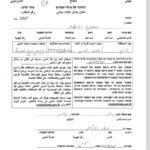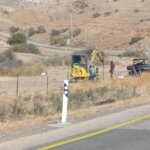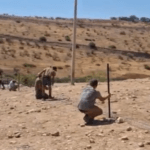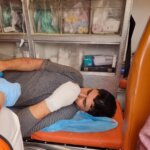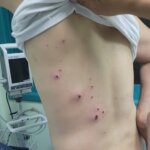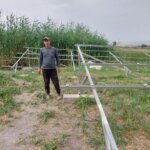Reclaiming agricultural land in Fasayil
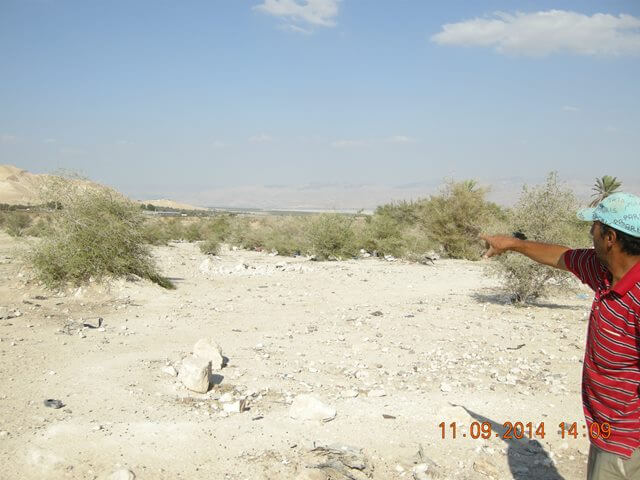 Jordan Valley Solidarity is running a major agricultural project with families in Fasayil, to re cultivate land that has lain bare for years due to Israeli control of water in the area.
Jordan Valley Solidarity is running a major agricultural project with families in Fasayil, to re cultivate land that has lain bare for years due to Israeli control of water in the area.
Historically, Fasayil had a water well, and was a green and prosperous area, with local Palestinian families growing bananas, lemons, grapes, and dates. This all changed with Israel’s occupation of the West Bank in 1967. Israel dug three deep water wells next to the existing Palestinian well, and imposed laws that restricted the depth of this and all Palestinian wells. As access to water became more and more scarce, the orchards and vineyards died off, and the local population were forced to change their way of life. Those who could became livestock farmers, whilst others were forced to work in Israel’s illegal settlements.
Things began to change in the village in 2007, when the local community began a partnership with Jordan Valley solidarity and international activists to build a school in Fasayil Al Fouqa, followed by a health clinic and fifty mud brick houses. In more recent years we have connected the village to electricity and running water, but this is restricted by the occupation.
In early 2014 we got permission to dig a new well in the village, which makes it possible to recultivate the traditional farmlands.
A group of eight local families have come together to set up an agricultural co-operative to start farming the area, with the support of our project, working in partnership with Mouvement pour une Alternative Non-violente (MAN), Center for Freedom and Justice (C4J), Association France Palestine Solidarité (AFPS), and Comité Palestine Israël Méditerranée et Pays de Châteaubriant.
This project is important not only for Fasayil village, but for all the Palestinian communities in the Jordan Valley. Israeli settlers from Tomer settlement want to recover Fasayil’s land for cultivation. They have already confiscated all the land between the road 90 and the Jordanian border, which used to belong to Fasayel’s families.
Through coming together to improvement their living conditions, Fasayel’s population has re-found its motivation to resist the occupation, and some have now reconstructed real houses in Fasayel al Foqa.
Our campaign for Fasayel is a real success in the long term, but a lot remains to be done to overcome all the problems that people have to face every day.
We would like to invite international activists to join our project and work with the people of Fasayil.
What you can do:
- Visit us in Fasayil, meet the families in the agricultural cooperative, and tell others about what they are doing
- Come and stay with us for a longer period, and share in the work of the agricultural cooperative
- Stay with us as a human rights observer, to record the occupation’s attempts to ethnically cleanse the Palestinian communities in the Jordan Valley
- Come and stay with us to support other communities in the Jordan Valley
- Make a donation to Jordan Valley Solidarity to support our work with local communities
- Join the campaign for Boycott, Divestment and Sanctions
Full details of our ‘Rehabilitation of Fasayel’s farmlands’ project
Background and relevance of the project
A. About Fasayel – localization and history
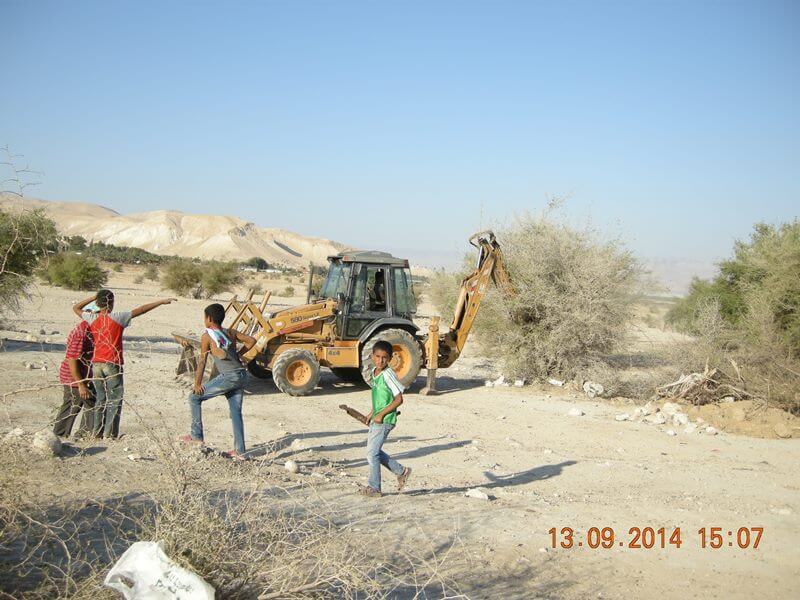 Fasayel is a village of Palestinian farmers and herders, which was settled in the 1920s. It is located in the Jericho Governate area, in the Jordan Valley. The oldest house in the village is eighty years old.
Fasayel is a village of Palestinian farmers and herders, which was settled in the 1920s. It is located in the Jericho Governate area, in the Jordan Valley. The oldest house in the village is eighty years old.
The village covers an extensive territory, over 2400 dunums. It is divided into three parts: Fasayel al Tahta, Fasayel al Wusta, and Fasayel al Foqa. Formerly, many families were living here, growing bananas, lemons, grapes, and dates. They had a water well, built before 1967 with a Jordanian license. The whole village was green.
Then the Israelis in 1967 occupied the Jordan Valley and built three wells in the village. They forbade Palestinians from digging more than one hundred and fifty feet deep yet dug right next to the Palestinian well and natural springs, at a depth of 800 meters. Therefore, the Palestinian well became dry, and soon afterwards the earth was no longer cultivable.
More than one hundred families have therefore left the village to find work in Jericho, Nablus, or Tubas.
Fasayel el Foqa and one israeli water well on the background
B. Actual situation
Today, Fasayel is divided in three parts. Fasayel al Tahta is in Area B, under joint Israeli and Palestinian control. The houses are built with concrete materials. There is a school and a grocery shop. But this is only a small part of the village. Fasayel al Wusta and Fasayel al Foqa are in Area C, under complete Israeli civil and military control. Therefore, the situation is even more complicated. Six homes are threatened with demolition orders in Fasayel al Foqa. Fasayel al Wusta is the part of the village that lives in the most difficult conditions: two years ago, the Israelis destroyed all its houses, three times in the same month. Some families stayed anyway and are now living in tents or barracks/tin shacks. All these temporary dwellings also received a demolition order from the Israelis, who can come at any time. Three were demolished in April, 2014. This extremely distressing situation causes many psychological issues within the population, especially with children and women. Fasayel al Wusta is the main target, as Israeli settlers from Tomer settlement want to recover this land for cultivation. They have already confiscated all the land between the road 90 and the Jordanian border, which used to belong to Fasayel’s families.
Fasayel al Wusta
Nowadays, Fasayel has 1,500 inhabitants. The village has water deliveries only every four days, and the electricity does not always work well. The majority of Fasayel al Wusta and Fasayel al Foqa’s population raises sheep and goats to produce milk and cheese. But a large part of the inhabitants of Fasayel are now working on the farms of the Israeli settlements, as they are unable to work on their land due to the lack of water. Their working conditions are extremely hard, eight hours per day, often in a sweltering heat, without health or retirement benefits, for only fifty to seventy shekels day.
C. Jordan Valley Solidarity’s campaign in Fasayel until now
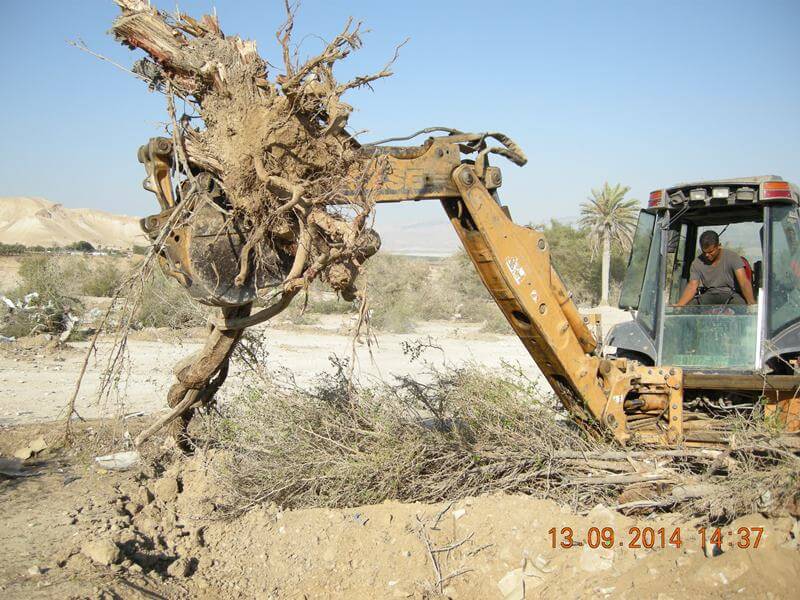 Jordan Valley Solidarity began its campaign for Fasayel in 2007. At that time, there was no connection to the main electricity lines, and no water. There were no house built in Wusta nor Foqa, and there was only one school in Fasayel al Tahta. When we got interested in this village, we started with a survey among the population to assess their needs and understand their situation, and we explained to them who we were and why we were here. Then the people decided that they needed to build a second school in Fasayel al Foqa, and we planned it. We built it with mud bricks, according to the Palestinian tradition. But at that time we were not professionals, so it was very difficult for us, and we had to start over three times. Finally, we built three rooms, and we were able to officially open the school. Immediately, the Israelis gave us a demolition order. We therefore conducted a campaign for the Media and politicians to save the school, and it was a success: today, one hundred and eighty children attend school.
Jordan Valley Solidarity began its campaign for Fasayel in 2007. At that time, there was no connection to the main electricity lines, and no water. There were no house built in Wusta nor Foqa, and there was only one school in Fasayel al Tahta. When we got interested in this village, we started with a survey among the population to assess their needs and understand their situation, and we explained to them who we were and why we were here. Then the people decided that they needed to build a second school in Fasayel al Foqa, and we planned it. We built it with mud bricks, according to the Palestinian tradition. But at that time we were not professionals, so it was very difficult for us, and we had to start over three times. Finally, we built three rooms, and we were able to officially open the school. Immediately, the Israelis gave us a demolition order. We therefore conducted a campaign for the Media and politicians to save the school, and it was a success: today, one hundred and eighty children attend school.
Following this success, the inhabitants of Fasayel began to really trust us, understand our work and how we resist the occupation, and cultivate hope again. We then built a small clinic, which is open three days a week, from 7am to 2pm. Outside these hours, people have to go to Jericho in case of an emergency, at a distance of twenty-five kilometers, which is very restrictive, especially because there is no public transportation between Fasayel and other Palestinian cities. Then we established an electricity connection and water pipes for the whole village, with the help of the Norwegian Embassy. Finally, we have built over fifty mud brick houses to allow people to return to the village. Through this campaign and all these changes and improvements in their living conditions, Fasayel’s population re-found its motivation to resist the occupation, and some have now reconstructed real houses in Fasayel al Foqa.
Our campaign for Fasayel is a real success in the long term, but a lot remains to be done to overcome all the problems that people have to face every day.
D. Why we chose Fasayel as part of our campaign to rehabilitate farmland in the Jordan Valley
In early 2014 we received permission to dig a new water well in Fasayel el Foqa. This well was completed in May 2th, 2014, which means that we can now cultivate the village lands. Within the project established in partnership between Jordan Valley Solidarity, MAN and the Freedom and Justice Centre of Beit Omar, which consists in rehabiliting agricultural lands in the Jordan Valley, we will fund and organize the cultivation of Fasayel al Foqa’s farmlands . We decided, in agreement with the people, to work on land of several different families. Indeed, some families have no cultivatable land, others do not have tools.
The local population is living under very difficult conditions due to the Israeli occupation. The families we will focus in are very poor and do not receive any support from anybody. They don’t have access to water, due to the Israeli water confiscation’s policy, and most of them do not own lands.
The project
A. Main goal
To rehabilitate farmland in Fasayel el Foqa by re-cultivating old farmland, abandoned due to the lack of water and other resources.
B. Target groups
Selection criteria
- Marginalised families
- Families with low incomes
- Families who don’t get any support from anybody (state, NGO, organizations…)
- Families who own very small farmers (a few sheeps only)
- Families severely affected by the Israeli water confiscation’s policy
- Saad Fehme Qasim Nemer
- Mohamad Khalil Mousa Tâmre
- Fadia Râjeh Zein Edin
- Soumeya Tâya Zin Edin
- Youssef Salame Khalil Âbayat
- Aemad Ali Salame Âbayat
- Jamal Kamal Mohamad Jaroan
- Mansour Mohamad Sawarka
Target families
[Most of the families are from Fasayel el Foqa]
C. Proceedings
First step: to chose the lands
- Families who own lands: we will work on it directly
- Families who do not own land: they will share lands with the other families.
Ex : Saad’s familiy has a land, he will cultivate it with Mansour and Jamal families.
Second step: to prepare the lands
- To cleanse the land of all debris and stones. For this we will hire workers,and a bulldozer.
- To build fences around it (aslo with the help of workers). We will buy the fences from the market who will give us the best price-quality ratio. We will buy all the fences from the same market.
Third step: to plant the trees
- To buy the trees : We will buy the trees from different places. We think about making agreement with the families : they will buy it, and we will give them the money.
- To plant olive trees, dates, and pomegranate.
D. Expected results
- Strengthening and unifying the community through communal farming.
- To regrow the village lands means to bring back life and vitality, and most importantly, to allow the people who are currently working in Israeli settlements to leave their jobs and to return to work on their land.
- It will also encourage families who left the village to come back, and thus strengthen the popular resistance in the Jordan valley.
- Finally, to rehabilitate farmland will allow the families to improve their life economically.

